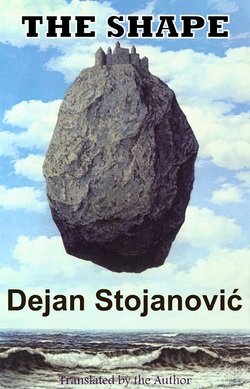
We will go far away
To nowhere
To conquer
To fertilize
Until we become tired
Then we will stop
And there will be our home
 Home of the Shape We will go far away To nowhere To conquer To fertilize Until we become tired Then we will stop And there will be our home
1 Comment
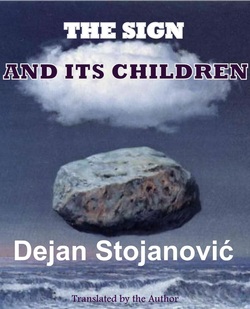 The Sign and Its Children The Over-Sky Sign The thought measures the new sight’s secret And the over-sky sign emerges Realizing what its arm is When with God it lives in solitude To sense the peace of extinguished passion Happiness in not knowing the ultimate knowledge Carelessness and delight, but with no delight Against both moving and dying 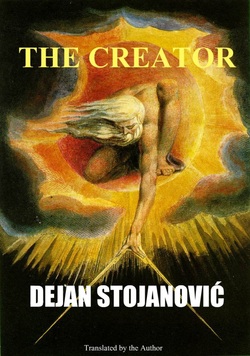 The Creator The Deceived Devil No sound, no light The world beyond existence Dead time No evil, no good Everything sleeps A deceived devil languishes 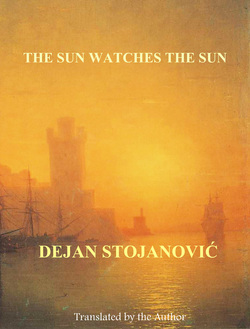 The Sun Watches the Sun The second collection of Dejan Stojanovic's verse, "The Sun is Watching Itself," is covered by a metaphysical and philosophical veil. Eleven segments are connected by these two abstract approaches and by such key images as a circle, suggesting infinity, and silence, reflecting space and eternity. The circle serves as a powerful symbol and a device of the perpetual in this poetry: "the end without endlessness is only a new beginning," claims the poet. Thus, one of the poems bears the title "God and Circle," symbolizing the perennial search for an exit and the eventual finding of one, which only leads into another circle and to continuous evolution. This prompts Stojanovic to pose the question "Is God himself a Circle?"--implying that God is endless and ever present. Although concise, the poems convey in a powerful and specific manner messages from the triad circle-God-eternity, connected by man's destiny and the poet's concept of human life and origins, and of the universe itself. In other words, microcosmic observations lead to macrocosmic revelations and didactic conclusions. The poems seem to teach us what is obvious in the context of common sense, often surprisingly remote to the modern man. In terms of style and format, the author has a coextensional approach; he uses relatively simple expressions and words in an interplay of brilliant meanings that bring about highly complex but easily readable structures. If elegance is represented by simplicity, then these are some of the most elegant verses imaginable; unadorned verses that are a source of beauty and wisdom. Stojanovic's perceptions of light and darkness, of fantasy and reality, of truth and falsehood present us with a circular format of infinity and resurrection. The format has its logical beginning and end. "The Sun is Watching Itself" begins with poems dedicated to God and the universe, then descends from the metaphysical to the philosophical, focusing on more ordinary such us the symbolic meaning of a stone, a game, a place, silence, hopelessness, and the question "Is it possible to write a poem?" Stojanovic's collection might well serve as an affirmative answer to this question. The poet has taken us on a long journey from God and universe to our everyday world. We all seem to be a part of a circle, says the author, searching for the eternal in the universe, only to realize the finality of life on earth. The poet's message is doubly effective for its extraordinary, soul-searching content and its reflective, powerful language. -Branko Mikasinovich, Washington, D.C. WLT World Literature Today, A Literary Quarterly of the University of Oklahoma, Norman, Oklahoma Volume 74, Number 2, Page 442, Spring 2000 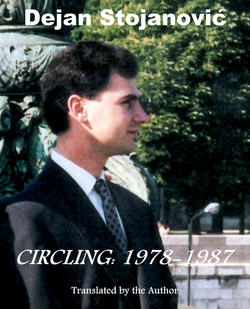 Circling: 1978-1987 In a colorful landscape of contemporary Serbian poetry, a careful reader can recognize that one of its branches, with a decidedly reflective experience of the poetic tradition and heritage, corresponds with a Serbian medieval age, opens up for its Byzantine chords and, in the context of contemporary poetry, is closest to Modern Classicism. In the first wave of Serbian post-World War II poetry, this stream was at the very foundation of a revival, which is almost suppressed today. It seems that precisely today, in the atmosphere of almost complete saturation by the practice of ever changing poetic trends, Serbian poetry is returning to its basics. This picture of a slow rebound, a long awaited reorientation on the Serbian poetic scene, is already happening, by all accounts, and is being sensed in the actual literary production. Reading the book Circling triggers the associations of this kind of a wave, which is not underground anymore, but has transformed itself into an actual poetic phenomenon. Dejan Stojanović, obviously, is not influenced by any contemporary poetic school or fashionable poetic trend, and is not trapped by some sensibility as a “follower.” Stojanović, as a reflective poet of mature thought and discourse, revives the atmosphere of the ancient (antic) times even in the first layers of his poems. It is easy to notice what specifically marks Stojanović in Serbian contemporary poetry: In weaving his poems and building his lines, a poet has returned to the antic form of utterance, to the difficult and slow movement of the poetic matter, to the dignified and solemn tone, and that kind of wisdom which was nourished in ancient times. Far from experiments, from challenges of hazards and poetic adventures, Stojanović’s poems exude the dignity of ancient forms. Similar to the techniques of painters, Stojanović condenses his utterances into short, harmonious poems, most often colored with Mediterranean colors, surprisingly successfully. His poems, almost by a rule, are condensed forms made of short utterances. In the second part of the book, poetic palette becomes darker with an introduction of fantastic and hallucinogenic elements and even apocalyptic tones. Nevertheless, the principle of condensation and consistency of form is never questioned. Apocalyptic scenes and images of evil are expressed in huge blocks that give the impression of a work of an architect or a sculptor. Such are the poems “Vision,” The Chess Board,” “Arrival of Darkness,” and “River of Death,” which all appear as compositions. There is a feeling that Stojanović wrote his poems along with visual compositions; to that extent, visual-imaginative effects are impressive. Specific, surprisingly original, outside the collectively nurtured sensibilities and fashionable trends, Stojanović is an extraordinary example of creative individualism in a generation that nourished such individualism the least. For that reason, the book Circling is not only an example of an extraordinary poetic achievement, which represents a strong encouragement to the important branch of Serbian poetry, but is also an announcement of a moral and spiritual project – a project that belongs to the tradition of Serbian poetry and thought in the best sense of the word. -Alek Vukadinović Afterward to the first Serbian edition (1993) Dejan Stojanovic’s poems are astute and spiritual tangents of a circle that comprises the phenomena hidden beyond the direct naming of the world and things in poetic transposition. With his poems, he seeks the borderlines between the content and its metaphysical expression, pure thought about the world and its essence. Passion and complete and easy flowing devotion to poetry and to the power of words, poetically and semantically, above all, shape his original poetic output. -Petar V. Arbutina If I knew
That grass broods while growing If I knew That a bird longs for the life while flying If I then watched insects As they mate and chirp I would have thought about meaning If I watched waves and saw How persistently they hit the shore If I felt the call of earth by seed All for all, life for life If I watched the heavenly bodies How each longs for a circle of fulfillment I would see soul in everything I found traces of natural wisdom In the slightest breeze and a bright smile In cataclysms and changes And although personal calling I sense Who am I? Even if I am I don't know -Dejan Stojanovic |
Dejan StojanovicDejan Stojanović was born in Pec, Kosovo (the former Yugoslavia). Although a lawyer by education, he has never practiced law and instead became a journalist. He is a poet, essayist, philosopher, and businessman and published six critically acclaimed books of poetry in Serbia: Circling, The Sun Watches Itself, The Sign and Its Children, The Shape, The Creator, and Dance of Time. Archives
May 2019
Categories
All
|